Google Professional Cloud DevOps Engineer
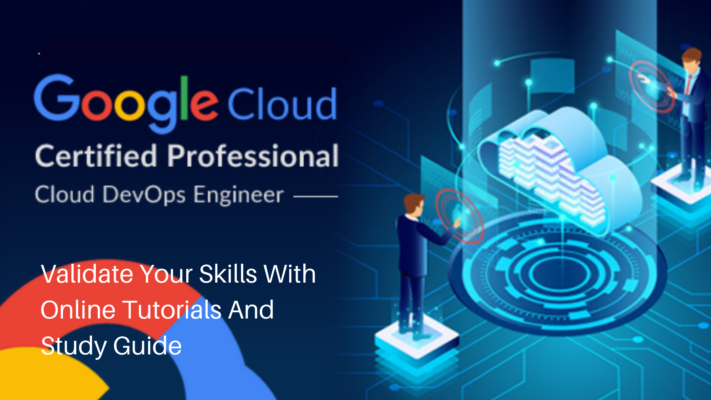
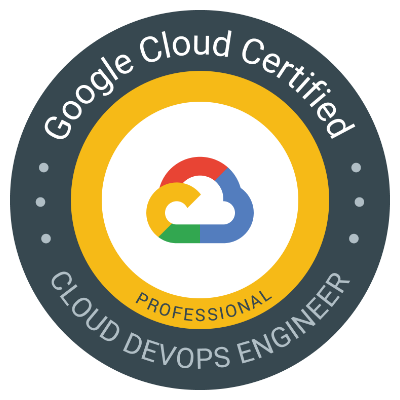
Google Cloud Platform has emerged out to be one of the universally recognized cloud platforms. In no time, it has successfully managed to give high competence to the already existing giants in the cloud platform – Amazon Web Services and Microsoft Azure. Google Cloud platform has achieved the highest status, and the Google Professional Cloud DevOps Engineer certification is greatly recommended for its applications in analytics, machine learning, and cloud-native.
Who should take the Google Professional Cloud DevOps Engineer Exam?
The chief perspective of the Google Professional Cloud Devops Engineer (GCP) Exam is to screen the calibre and proficiency of professionals in applying the tactics of the cloud platform. Candidates are screened in handling the responsibility in the efficient development of operations, and to balance service reliability and delivery speed. Candidates should ace at the application of Google Cloud Platform in building software delivery pipelines, deploying and monitoring services, and managing and learning from incidents.
The Professional Cloud DevOps Engineer Exam is primarily designed for these professionals –
- On-premises IT system administrators
- Cloud solution architects and application developers
- DevOps professionals with industry experience
- Aspiring DevOps professionals with limited GCP experience
- On-premise system engineers
Expertise Validated
Professional Cloud DevOps Engineer is the Best Cloud Engineer Certification as it validates the expertise of the candidates in –
- Applying site reliability engineering principles to any service
- Optimizing service performance
- Implementing service monitoring strategies
- Building and implementing CI/CD pipelines for a service
- Managing service incidents
About Google Cloud Platform Professional Cloud Devops Engineer
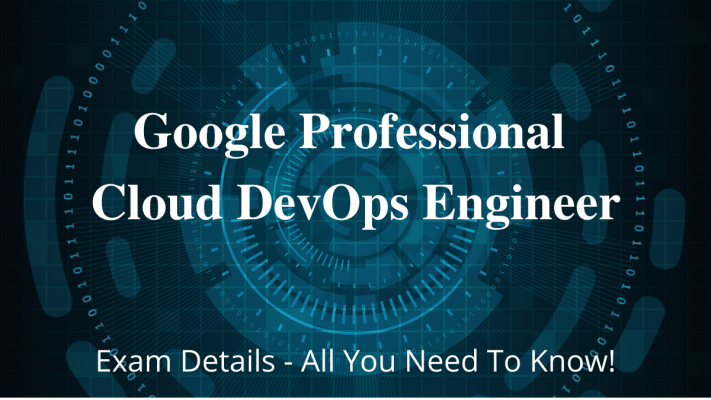
Exam Details
The Professional Cloud DevOps Engineer will comprise of around 102 multiple-choice, and multiple select questions. Candidates will be assessed on the basis of these questions. As far as the exam duration is concerned, this exam will be for a duration of 4 hours. An application fee of $200 (plus tax where applicable) is to be paid to take the exam.
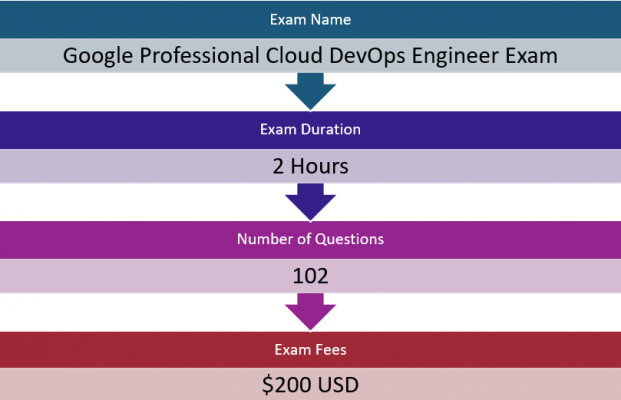
The Google Professional Cloud Devops Engineer Certification Exam Questions will be a complex mixture of important domains in the cloud platform. Namely, DevOps, Site Recovery, and Google Services [Stackdriver, Cloud Build, Kubernetes Engine, Container Registry, etc]. The perspective of the exam will be focused on operations and development in the cloud platform.
Exam Terms and Conditions
Certification/Revocation
Google considers the disclosure of Confidential Information as clear a violation of its Terms. Such a reported violation can compromise the security, and integrity of Google’s certification programs. The exams are made available to candidates with the sole purpose of demonstrating their skills, and competency in that particular area.
Any such violation of these Terms will lead to prohibition from taking any Google Certification Exam. Moreover, Google holds the right to decertify you, and it may, in its sole discretion, terminate any business relationship with you, prohibiting access to its exam services.
Certification Renewal / Recertification
You are supposed to get yourself recertified for the maintenance of your certification status. Google Cloud certifications are valid only for a period of two years, unless otherwise explicitly stated in the exam descriptions. Recertification attempts can be taken 60 days prior to the expiration date of your certification.
Check Google Professional Cloud DevOps Engineer Interview Questions
Failing and Retaking the Exam
In case you fail in the exam, you can retake the Exam, at your convenience. However a waiting period of at least fourteen (14) days is required before retaking the exam. In case you fail in the second attempt also, then you may go for another retake, but after a waiting period of at least sixty (60) days. You will get only three retakes, with the third one requiring a waiting tenure of at least one (1) year.
For More Details See – Google Professional Cloud DevOps Engineer Exam FAQs
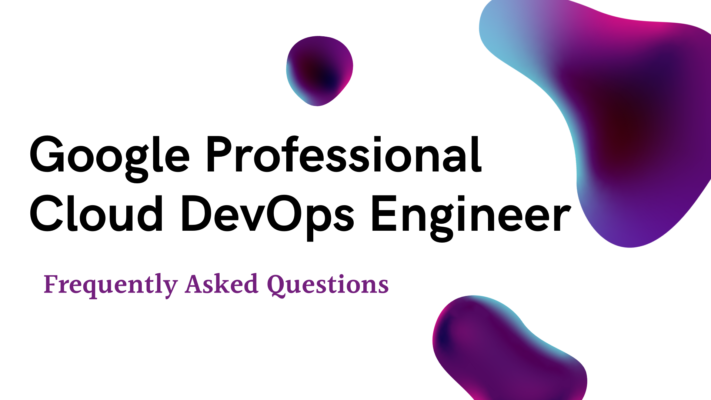
Google Professional Cloud Devops Engineer Course Outline
Google Cloud Platform provides a well-elaborated exam guide, containing the exam domains, and its objectives. The Google Professional Cloud Devops Engineer Syllabus is as follows:
Topic 1: Bootstrapping a Google Cloud organization for DevOps
1.1 Designing the overall resource hierarchy for an organization. Considerations include:
- Projects and folders
- Shared networking
- Identity and Access Management (IAM) roles and organization-level policies
- Creating and managing service accounts
1.2 Managing infrastructure as code. Considerations include:
- Infrastructure as code tooling (e.g., Cloud Foundation Toolkit, Config Connector, Terraform, Helm)
- Making infrastructure changes using Google-recommended practices and infrastructure as code blueprints
- Immutable architecture
1.3 Designing a CI/CD architecture stack in Google Cloud, hybrid, and multi-cloud environments. Considerations include:
- CI with Cloud Build
- CD with Google Cloud Deploy
- Widely used third-party tooling (e.g., Jenkins, Git, ArgoCD, Packer)
- Security of CI/CD tooling
1.4 Managing multiple environments (e.g., staging, production). Considerations include:
- Determining the number of environments and their purpose
- Creating environments dynamically for each feature branch with Google Kubernetes Engine (GKE) and Terraform
- Anthos Config Management
Topic 2: Building and implementing CI/CD pipelines for a service
2.1 Designing and managing CI/CD pipelines. Considerations include:
- Immutable artifacts with Container Registry (Google Documentation: Help secure software supply chains on Google Kubernetes Engine, Managing images)
- Artifact management with Artifact Registry
- Deployment to hybrid and multi-cloud environments (e.g., Anthos, GKE)
- CI/CD pipeline triggers
- Testing a new application version in the pipeline
- Configuring deployment processes (e.g., approval flows) (Google Documentation: Setting up a CI/CD pipeline for your data-processing workflow)
- CI/CD of serverless applications
2.2 Implement CI/CD pipelines:
- Auditing and tracking deployments (e.g., Artifact Registry, Cloud Build, Google Cloud Deploy, Cloud Audit Logs)
- Deployment strategies (e.g., canary, blue/green, rolling, traffic splitting)
- Rollback strategies
- Troubleshooting deployment issues
2.3 Managing CI/CD configuration and secrets. Considerations include:
- Secure storage methods and key rotation services (e.g., Cloud Key Management Service, Secret Manager) (Google Documentation: Cloud storage)
- Secret management
- Build versus runtime secret injection
2.4 Secure the deployment pipeline:
- Vulnerability analysis with Container Registry (Google Documentation: Getting vulnerabilities and metadata for images)
- Binary Authorization (Google Documentation: Binary Authorization)
- IAM policies per environment (Google Documentation: Policy)
Section 3: Applying site reliability engineering practices to a service
3.1 Balancing change, velocity, and reliability of the service. Considerations include:
- Discovering SLIs (e.g., availability, latency)
- Defining SLOs and understanding SLAs
- Error budgets
- Toil automation
- Opportunity cost of risk and reliability (e.g., number of “nines”)
3.2 Managing service lifecycle. Considerations include:
- Service management (e.g., introduction of a new service by using a pre-service onboarding checklist, launch plan, or deployment plan, deployment, maintenance, and retirement)
- Capacity planning (e.g., quotas and limits management)
- Autoscaling using managed instance groups, Cloud Run, Cloud Functions, or GKE
- Implementing feedback loops to improve a service
3.3 Ensuring healthy communication and collaboration for operations. Considerations include:
- Preventing burnout (e.g., setting up automation processes to prevent burnout)
- Fostering a culture of learning and blamelessness
- Establishing joint ownership of services to eliminate team silos
3.4 Mitigating incident impact on users. Considerations include:
- Communicating during an incident
- Draining/redirecting traffic
- Adding capacity
3.5 Conducting a postmortem. Considerations include:
- Documenting root causes
- Creating and prioritizing action items
- Communicating the postmortem to stakeholders
Topic 4: Implementing service monitoring strategies
4.1 Manage logs:
- Collecting structured and unstructured logs from Compute Engine, GKE, and serverless platforms using Cloud Logging
- Configuring the Cloud Logging agent
- Collecting logs from outside Google Cloud
- Sending application logs directly to the Cloud Logging API
- Log levels (e.g., info, error, debug, fatal)
- Optimizing logs (e.g., multiline logging, exceptions, size, cost)
4.2 Managing metrics with Cloud Monitoring. Considerations include:
- Collecting and analyzing application and platform metrics
- Collecting networking and service mesh metrics
- Use metric explorer for ad hoc metric analysis (Google Documentation: Metrics Explorer)
- Creating custom metrics from logs
4.3 Managing dashboards and alerts in Cloud Monitoring. Considerations include:
- Creating a monitoring dashboard
- Filtering and sharing dashboards
- Configuring alerting
- Defining alerting policies based on SLOs and SLIs
- Automating alerting policy definition using Terraform
- Using Google Cloud Managed Service for Prometheus to collect metrics and set up monitoring and alerting
4.4 Managing Cloud Logging platform. Considerations include:
- Enabling data access logs (e.g., Cloud Audit Logs)
- Enabling VPC Flow Logs
- Viewing logs in the Google Cloud console
- Using basic versus advanced log filters
- Logs exclusion versus logs export
- Project-level versus organization-level export
- Managing and viewing log exports
- Sending logs to an external logging platform
- Filtering and redacting sensitive data (e.g., personally identifiable information [PII], protected health information [PHI])
4.5 Implementing logging and monitoring access controls. Considerations include:
- Restricting access to audit logs and VPC Flow Logs with Cloud Logging
- Restricting export configuration with Cloud Logging
- Allowing metric and log writing with Cloud Monitoring
Topic 5: Optimizing service performance
5.1 Identify service performance issues:
- Using Google Cloud’s operations suite to identify cloud resource utilization
- Interpret service mesh telemetry (Google Documentation: The service mesh era)
- Troubleshooting issues with compute resources
- Troubleshooting deploy time and runtime issues with applications
- Troubleshooting network issues (e.g., VPC Flow Logs, firewall logs, latency, network details (Google Documentation: VPC Flow Logs overview, Using VPC Flow Logs, Using Firewall Rules Logging)
5.2 Implementing debugging tools in Google Cloud. Considerations include:
- Application instrumentation (Google Documentation: Cloud Monitoring)
- Cloud Logging
- Cloud Trace
- Error Reporting
- Cloud Profiler
- Cloud Monitoring
5.3 Optimize resource utilization and costs:
- Preemptible/Spot virtual machines (VMs)
- Committed-use discounts (e.g., flexible, resource-based)
- Sustained-use discounts
- Network tiers
- Sizing recommendations
Preparation Guide For The Google Professional Cloud DevOps Engineer Exam
Choosing the best exam preparation strategy is very crucial to crack any certification exam. When it comes to the Google certification Exam, it is of utmost importance that you make the right choice and head towards a successful, and rewarding career in the Google cloud platform. So let’s begin with the preparation with Google Professional Cloud Devops Engineer Study Guide
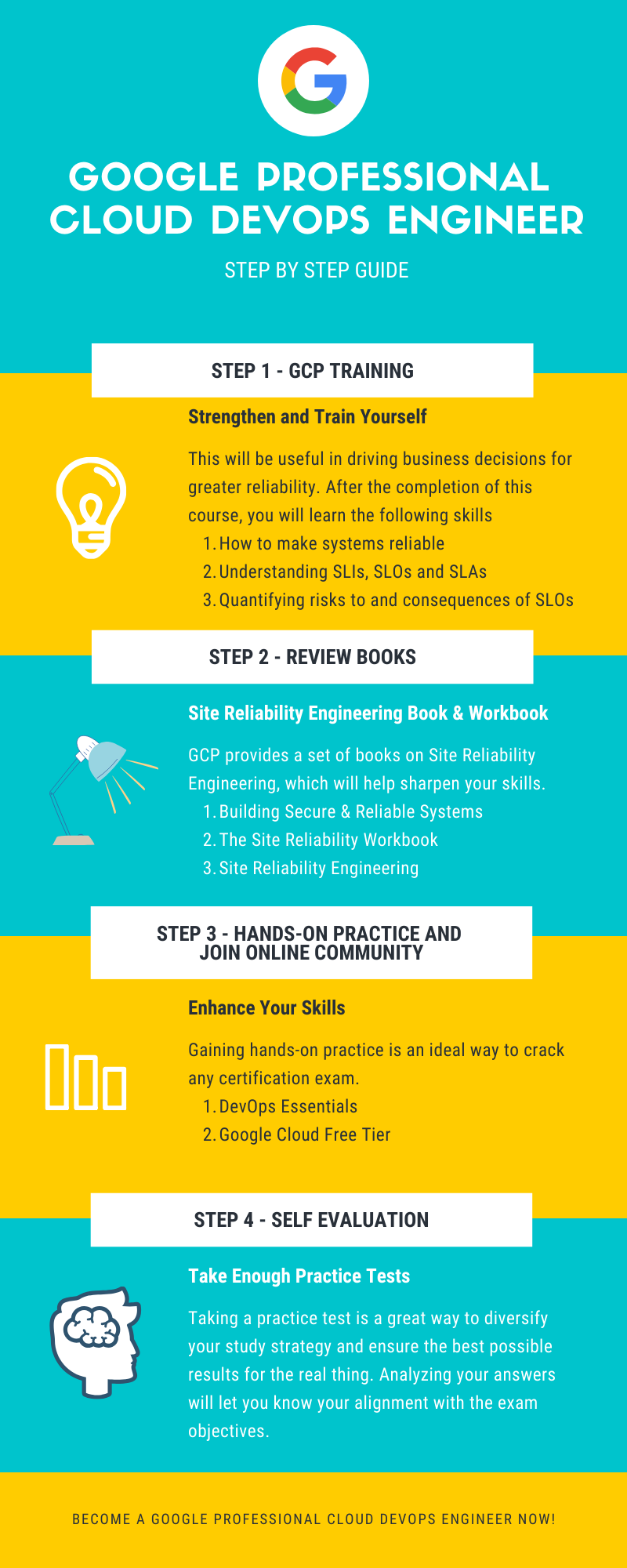
Review the exam guide
Before heading towards your preparation journey, you must get yourself familiar with the main objectives of the Google Professional Cloud DevOps Engineer Exam. GCP provides the candidates taking it’s certification, with a well-structured exam guide. Knowing the exam objectives is very important to get an insight into the exam. So visit the Official website of GCP, to have a clearer view of the exam guide. A thorough analysis of the exam guide will let you align yourself more deeply with the chief objectives if the exam. And hence, enabling you to gain the required command to earn your desired certification.
Google Professional Cloud Devops Engineer Training
Site Reliability Engineering: Measuring and Managing Reliability
Google Cloud Platform offers this course, which teaches the Service Level Objectives (SLOs) theory. Candidates will be trained with the principles in describing and measuring the desired reliability of service. You will learn the application of these principles in developing the first SLOs for services. Moreover, this course also guides the candidates with the use of Service Level Indicators (SLIs) to quantify reliability and Error Budgets. This will be useful in driving business decisions for greater reliability. The course will also help you gain expertise in the components of SLI, and developing SLIs and SLOs for a service.
After the completion of this course, you will learn the following skills
- How to make systems reliable
- Understanding SLIs, SLOs and SLAs
- Quantifying risks to and consequences of SLOs
Site Reliability Engineering Book & Workbook
GCP provides a set of books on Site Reliability Engineering, which will help sharpen your skills.
1. Building Secure & Reliable Systems – Here in this book, various experts from Google have shared their best practices that can help any organization in designing scalable and reliable systems. Also, the book contains a guide to the preparation of strategies that are fundamentally secure for an organization.
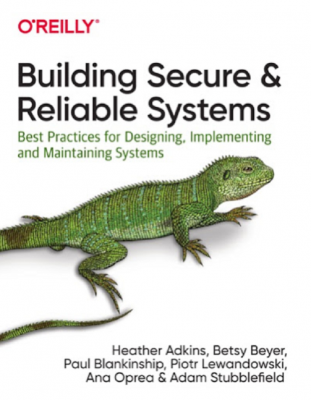
2. The Site Reliability Workbook – This book beautifully showcases the methodology of using SRE principles and its practical applications. The book also contains several practical examples, from GCP customers, of Google’s experiences and case studies.
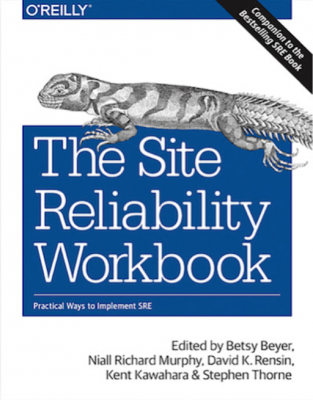
3. Site Reliability Engineering – In this book, the SRE team members have explained their engagement with the entire software lifecycle. And also, how this has enabled Google to build, deploy, monitor, and maintain the world’s largest software systems.
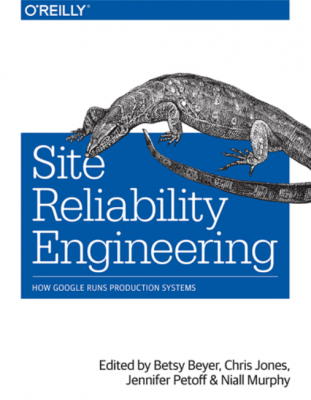
Hands-On Practice
Gaining hands-on practice is an ideal way to crack any certification exam. As with the GCP DevOps Engineer Exam, GCP recommends joining hands-on labs which are available on Qwiklabs, and also GCP free tier to elevate your proficiency in the cloud platform.
DevOps Essentials – This quest will allow you to gain an understanding of the use of Google Cloud. With the help of Google Cloud, you will be able to enhance your software delivery capability in parameters like – speed, stability, availability, and security.
Google Cloud Free Tier – Through this platform, GCP provides you with free resources to gain a deeper knowledge of Google Cloud services, by allowing you to get enough practice. Google Cloud Free Tier covers the requirements of professionals at different levels – beginners, and experienced professionals. The Google Cloud Free Tier consists of two parts –
- 12-month free trial plus a credit of $300 that may be used with Google Cloud services
- Always Free – It provides limited access to Google Cloud resources, without charging money
Join the Community/ Online Forum
A healthy discussion is always beneficial, no matter where it is done. The same goes for online discussion forums. This is a nice way for the students to discuss their issues and get insights into how their competitors are going for the exams. One thing which is an advantage for anything that comes online is the scope of people joining it. An offline discussion is restricted to a small number of people, whereas online platforms can reach a wider range. The prospects of getting resolutions to an issue increase steeply when a greater number of people are involved. Also, multiple viewpoints make the stuff more dynamic. These discussions make the studies more comprehensive. Introverts get a chance to express themselves, who might otherwise prefer staying out of discussions. Forums work really well to build a community that is essential for understanding others.
Self-evaluation Time – Practice Exam
Regardless of how you prepare for the Exam, a practice run or two can help you in more ways than you might expect. Taking a Google Professional Cloud Devops Engineer Practice Exam is a great way to diversify your study strategy and ensure the best possible results for the real thing. GCP offers the Cloud DevOps Engineer practice exam, to enable candidates to gain insight into the pattern of questions asked. Analyzing your answers will help you identify the areas where you need to give special attention to, and will also let you know your alignment with the exam objectives.

